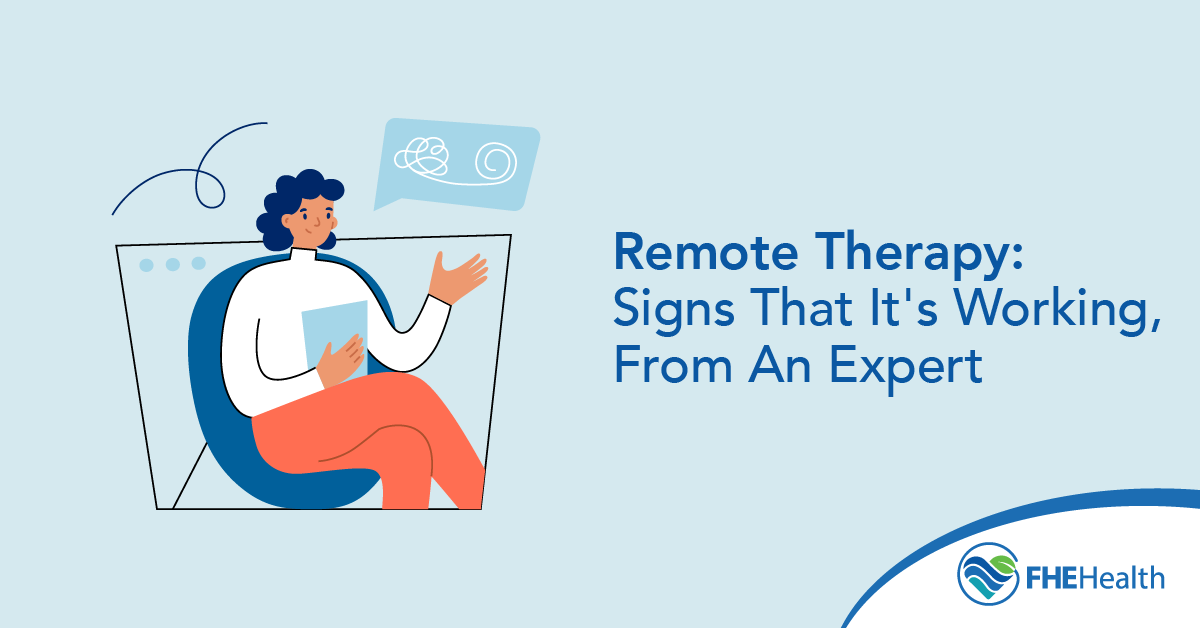
More Americans than ever before are receiving therapy, and most of them — via a working Internet connection and online meeting platform. Remote therapy soared in popularity during the pandemic and has only continued to gain ground, thanks to its convenience and other advantages. Such benefits have helped many people access therapy to reap positive results.
Yet it’s also not uncommon to wonder whether remote therapy is working. Gauging progress can be hard to do, whether you’re just starting remote therapy or have been receiving these services for years. Sometimes, a lack of education in this area can prevent people from even trying therapy in the first place.
What, then, are some signs that remote therapy is working and things to look for and expect when vetting its effectiveness? We reached out to Chief Clinical Officer Dr. Beau A. Nelson, DBH, LCSW, for answers. Dr. Nelson began practicing therapy more than 25 years ago in a traditional brick-and-mortar office. About 10 years ago, he transitioned to telemedicine and became a Certified Telehealth Practitioner. Catch his tips and insights below.
How to Gauge Whether Therapy Is Helping
Remote therapy can help people face life challenges, develop greater self-awareness, learn valuable coping skills, address unhealthy behaviors, improve their relationships, and manage stress and mental and emotional challenges; but progress in these areas is not always immediately obvious. What are some ways to gauge whether therapy is really helping?
“Starting therapy is a bit like starting a skincare routine,” Dr. Nelson said. “You might not notice daily changes, but over time, the difference becomes apparent.” He offered the following tips for evaluating progress:
- Objective assessments that measure symptoms – “In therapy, using occasional objective tests to measure symptoms like depression or anxiety over time can help track progress.”
- Other people’s observations — “Often, others notice our changes before we do. While we might dismiss their observations, these external perspectives are valuable.”
- Defining what “success” will look like at the outset — “Therapy addresses many issues, but instead of measuring each separately, it’s helpful to discuss at the beginning what success looks like. Discussing what it will feel like when you’re done can guide the process.”
- SMART goals — “While broad goals like ‘I’ll be happy’ are hard to measure, using SMART goals — “specific, measurable, achievable, realistic, and time-limited” — provides clarity. Practical examples include feeling more rested, engaging in healthy habits, managing emotions better, practicing mindfulness, or reducing negative thoughts.
Potential Challenges of Remote Therapy
What are some challenges or limitations of remote therapy? Dr. Nelson mentioned the following.
Technology and Connectivity Issues
“In my experience, the biggest challenge of telemedicine is the technology itself,” Dr. Nelson said. “Patients and practitioners generally adapt quickly to teletherapy due to its convenience — no travel, comfort of home, and fewer disruptions. However, internet connectivity and unfamiliar technology can pose hurdles, particularly for those less tech-savvy.”
Lack of Direction or Open Communication
Another limitation can be the lack of “a clear plan” or “open communication” about what’s working and what’s not:
Not all therapists and patients discuss symptom reduction, goal setting, or measuring progress objectively. Therapy can feel less scientific than clinical research. While some patients may enjoy therapy sessions, they might not achieve their initial goals unless there is a clear plan. Open communication is crucial for acknowledging both progress and challenges along the way.
Accessibility and Fit of Therapist
“The broader challenges of therapy often revolve around accessibility and the fit between patient and therapist. Not every therapist is suited for every patient,” Dr. Nelson said. He cited research that shows “the quality of the therapeutic relationship is the strongest predictor of a successful outcome.”
“Additionally, evidence-based treatments are more widely available now, and applying the right treatment to the right diagnosis is critical for success,” Dr. Nelson continued. “Finding the right match may take time, and this can be difficult when someone is struggling.”
These limitations aside, Dr. Nelson firmly believes that “teletherapy is the future of accessible behavioral health services” — and that the right fit of therapist can be transformational: “A strong therapist-patient fit, honest and goal-oriented sessions, and supportive lifestyle changes can lead to significant benefits.”
What to Expect from Therapy
What might someone considering therapy realistically expect to get out of it?
“Therapy is just one tool to promote a healthy lifestyle,” Dr. Nelson said, and progress in therapy “is a process, not a demand. It involves growth, setbacks, and keeping goals in sight.”
At the same time, “many achieve quick results when goals are focused, the therapeutic relationship is strong, and evidence-based treatments are applied. Others might engage in therapy periodically throughout their lives as needs evolve.”
Advice for Those Hesitant about Remote Therapy
What advice would Dr. Nelson offer those who are hesitant about remote therapy? He recommended “giving it a try,” then shared this experience:
When I moved states 10 years ago, many of my in-person patients wanted to continue therapy remotely despite having local alternatives. Initially, I was unsure if it would be the same “full” experience. However, I soon saw benefits like reduced missed appointments and greater flexibility, leading me to transition fully to teletherapy even before COVID-19.
Therapy can be beneficial for anyone, Dr. Nelson added, not just for those with a specific mental health diagnosis:
Many people find value in having a trusted, non-judgmental support system … Ultimately, utilizing supportive resources, including therapy, is a sign of strength. Being honest, communicating needs clearly, and self-monitoring contribute to a positive therapeutic experience for both patient and practitioner.






